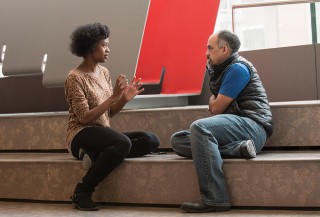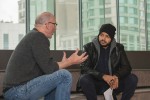Title

Medina Senghore and Orlando Pabotoy
(Photo by Jonathan Tichler)Each spring, the fourth-year drama students produce three plays in repertory. Here, an actor from each one interviewed his or her director.
Body
The Serpent Woman, Venetian playwright Carlo Gozzi's bittersweet 1762 commedia dell'arte fairy tale, is directed by alumnus Orlando Pabotoy (Group 27). He was interviewed by Medina Senghore, who plays Cherestani, the queen of the Fairy Kingdom and wife of Prince Farruscad.
What was your initial reaction to The Serpent Woman?
The first time I read it I wanted to jump into it. The imagination of Gozzi's writing is audacious. You're introduced to worlds that you can only enter if you imagine or dream—or have nightmares. And I was really fascinated, and irritated, at the word miracle. Not so much that it was irritating at that time; it was charming. But I know it can be annoying when a play insists on something that, the majority of the time, people look at as being very naïve. And because of that, it became a challenge.
So you read it and you were like, “I want to direct this”?
Not so much I want to direct it, but I want to investigate it. I never see myself as a director. When I see very clearly where something needs to go, I lead it there. But it's more that I feel that when I'm directing, I'm being led. I'm being directed by something else. It's like, “O.K., this is where we need to go,” and my job is to get everybody to go there with me.
What's challenging about it?
Most performers are afraid of engaging the emotion beyond naturalism because everybody wants to be truthful. What is beyond what's seen in everyday life is rarely explored because of that fear of being untruthful. I think that truth can be investigated, but we have to have fun in the investigation. The element of fun is a necessary vocabulary for commedia.
Why is it important to do The Serpent Woman now?
For me to say this play is needed is a bit arrogant. It's just a simple investigation and a question that's been lingering for me, and I have to listen to it. However, I am really interested in trying to imagine the mindset of the public during the time the play was written, the Age of Enlightenment. The last project that I did when I was studying at Juilliard, in 1998, was Tartuffe; the director was Garland Wright (faculty 1995–98), and he said that the Age of Enlightenment was the time when people started to break away from blind faith—the thinking that maybe there isn't a God, maybe I can get away with something bad, maybe I can commit a sin and get away with it. That was the beginning of that. And he said that the difference between now and then is that we are the exact opposite. We know too much. We are so cynical that any type of belief is audacious. So why this play now? To me, it's an investigation into whether miracles can exist in this mindset. And I think that question can be entered into from a place of delight.
Sight Unseen by Donald Margulies, which premiered in 1991, is the nonlinear story of an artist who runs into a former lover and what happens to both their families. The director, Hal Brooks, was interviewed by Eric Harper, who plays Nick, a fiercely loyal, painfully shy archaeologist living in England with his wife, Patricia, when suddenly her ex-lover Jonathan, a successful artist, comes to visit.
When did you know you wanted to be a director?
I had a great teacher at the now defunct New Actors Workshop (ACT) named Jack Fletcher, and he approached a play in a way that made you feel like it was the answer to the questions of the mysteries of the world.
What's the most challenging part of directing?
There's this quote, “Style is knowing what play you're in.” Your job as a director is matching your actor to the style of the play you're in. Our task here is to match everyone to the style of this play.
What draws you to Sight Unseen and Donald's writing generally?
I think it's a great play. I saw it 25 years ago and remember it vividly. When you're 25 you're going to see it in a different way than when you're 50. What I remember about it then is the struggling artist; I see it through a different lens now, and that makes it very exciting for me.
What draws me to the writing is his ability to capture the trickiness of memory. In Jonathan's journey to piece together his life and success, he's looking for something that's missing. I don't think he totally knows what it is, but he knows it somehow has to do with Patricia and he has to visit her to uncover why he isn't satisfied with his success. The other thing that draws me to this play is that it isn't in chronological order—it's a bit of a collage. As a director I have to put it together, and you as an audience have to piece it together.
When you direct at Juilliard, are you involved in the casting process?
I”m not. But I think Richard [Feldman, acting director of the Drama Division] does a really good job of making sure you have the role that you need in the time that you need it and the play is picked accordingly.
What do you wish you knew starting out that you know now?
Patience and focus. I'm smarter now about where to put my energy, because I'm focused. There's also a lot of power in being able to say, “I don't know,” which I'm fine with saying now.
What play are you itching to direct? Or does it not work like that?
The Cherry Orchard. I'd like to do Platanov. Hamlet, oddly enough. I hear it's good.
The fourth-year rep version of Shakespeare's Othello is an adaptation prepared by director Jonathan Rosenberg working with Chelsea Marcantel (Playwrights '16). Justin Cunningham, who has the title role, interviewed Rosenberg.
Why did you want to do this play?
Different productions of Othello find different ways into the narrative, but what really strikes me when I read or see it is the unapologetic, really out-there, racist language. I think the play really slams you into a world in which racism is just in the molecules in the air. Here's a man who has quite high political and social standing but who has to exist in this toxic atmosphere; a man who has to live and negotiate this atmosphere all the time. In a way it's almost the perfect example for the Obama years in America—that seems to be exactly the way he had to deal with his presidency.
Do you think Othello is a racist play?
I'm sort of teetering, I'm not sure. There are some who are of the opinion that Shakespeare is less concerned with the sort of complex, three-dimensional, psychology of Othello. Some believe he's more interested in the outward behavior of Othello as he receives and negotiates the information that comes through him via Iago, through which stereotypes could be projected onto the character. As opposed to a character like Macbeth, for example, where Shakespeare is digging into the psychology of the character. One could argue there are behavioral tropes, at least in the second half of Othello, that you could fall into unless you work against them.
What do you want to give the audience with your interpretation of the play?
I think that one of the things that Chelsea and I were conscious of—and this may be related to me growing up in South Africa—were the specifics of human behavior and social interaction deformed and infected by an overall toxic political and social environment. The politics are not necessarily in the play, but you're watching human beings trying to negotiate life in this deformed social environment. I want to see if we can create this kind of toxic atmosphere and if an audience can experience how it affects the human interactions of this relatively small group of people. For me, the stage space is not simply a container for action, it's a dynamic participant that interacts with the human beings on stage in an active way.
What's something positive we can take from this play?
One can look at the unfolding narrative and say “Wow, you just can't trust anybody, because people will betray you.” But you could also take away the opposite of that, which is that one could engage in an open way with other human beings and understand that there are no guarantees. And even when betrayal happens or things go wrong, it's important to think the best of people even if you have scars afterward. I think as human beings, we have to make that choice. Do we engage the world in a suspicious way—
assuming the worst about people—because frequently those suspicions come true and people do disappoint you? Or is it better to live one's life embracing friends and expecting the best of people and understanding that disappointments are merely the scars of life that are necessary to live?
Fourth-year actors Justin Cunningham, Eric Harper, and Medina Senghore all have Steinberg Fellowships. Cunningham and Senghore also hold McKnight Foundation Scholarships in Drama.






